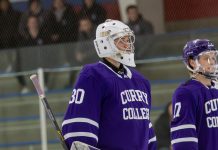It is impossible to wrap my head around the abrupt end of college hockey season. This isn’t news to you by now, I’m sure, but there will be no more college hockey (or NCAA anything) for the immediate future.
The last 72 hours have been surreal. Many of you know that I teach at Mott Community College in Flint, Mich. We are currently on spring break, and my colleagues and I are anxiously watching events unfold in higher education. Locally, Michigan State was the first to announce a move to online classes. Michigan — including its campus in Flint — announced this move soon after. As colleges and universities across the country began to limit social interaction, I knew it was only a matter of time before the NCAA would do the same.
In case you haven’t heard, the governors of Ohio and Michigan have closed all K-12 schools for the next three weeks. It’s the responsible thing to do. I suspect other states will do the same. We all expect other changes in the next six to eight weeks that will disrupt our lives and challenge us. We should all commit to keeping ourselves and those around us as healthy as we can.
Unfortunately, that means a good deal of social distancing — and that means the end of the season of the sport that we love so much.
My heart breaks for the student-athletes whose seasons have just ended with no warning. I cover only D-I men’s ice hockey, and I am thinking especially of the young men I know for whom this is the highest level of organized hockey they will ever play — although I know that this effects many, many women and men in several sports across the NCAA and NJCAA. For all who played their last game without knowing it was their last game, the feeling of being robbed of something sacred must be overwhelming. There is no closure for these student-athletes, no awareness of that one last time. No tears in defeat. No trophies for champions. Just nothing.
My heart breaks, too, for all of the student reporters, photographers, and broadcasters who — like the student-athletes — may have covered their last collegiate game without knowing it.
It’s college. They’re kids. And their lives have changed abruptly and in some cases permanently, and all within days.
I’m sad for the coaches and staffs that have worked so hard through long seasons, the on-ice officials who didn’t know they were skating their last games, the off-ice officials, everyone in all of the athletic departments who are processing what’s just happened. The ushers and other people who work the arenas. The pep bands. The student sections. The mascots. The fans. Everyone for whom the ritual of weekly games is an important part of their lives.
There are many people for whom this is a huge financial hit as well, especially freelance reporters who depend on playoffs for a good chunk of their yearly income.
And I am not going to lie: I shed real tears when I realized that I won’t be seeing my hockey family at the Frozen Four this year. It really is a family. Close to home, the USCHO family is tight, with friendships that span decades. It’s an extended family, though, of other reporters and broadcasters, people in sports information, coaches, fans.
Then there’s Detroit, a city that can’t catch a break.
On Tuesday in our weekly TMQ, Jimmy Connelly and I talked about how the coronavirus might impact NCAA play. On Wednesday, Jimmy and Jayson Moy posted their latest Bracketology. Yesterday — before we knew the season would end so abruptly — my excellent writing partner, Drew Claussen, posted a great Big Ten column looking at the playoffs.
And then the season was over. Just like that.
This post is more than a lament for something we’re all mourning. I do want to wrap up the season’s picks.
Last week
Drew: 4-3 (.571)
Paula: 3-4 (.429)
Final for the season
Drew: 85-57-16 (.589)
Paula: 74-68-16 (.519)
I’m glad I finished above .500.
Tweet us
I don’t know what’s in store for USCHO in the coming weeks, but you can find out by following us (@USCHO) on Twitter. Also, stay in touch with Drew (@drewclaussen) and me (@paulacweston) in the coming weeks and in the offseason.
Stay safe. Please take care of yourself. Thanks for being here with us.


